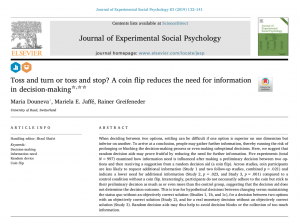Rainer Greifeneder, Mariela Jaffé, and I have a new paper out in the Journal of Experimental Social Psychology, in which we examine how simply seeing a random device such as a coin flip providing a suggestion can influence the need for information before settling for a decision. No matter whether it’s a hypothetical decision about prolonging someone’s contract, judging which one of two backpacks costs more, or deciding which medical charity receives money – coin participants are less likely to request additional information and indicate a lower need for additional information compared to control participants without a coin flip. Interestingly, participants do not necessarily adhere to the coin but stick to their preliminary decision as much as or even more than the control group. A coin flip may thereby help to avoid decision blocks or the collection of too much information.

Be the first to leave a comment. Don’t be shy.